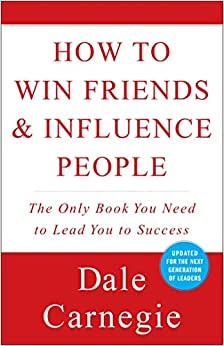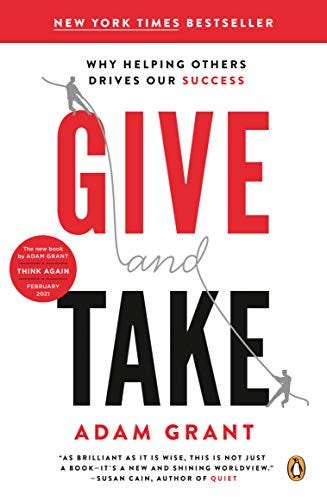TIN #030 - What To Read To Be A Better Networker
These five books will help you understand networking
Good Morning 👋 - Greg here.
Happy Saturday to everyone who’s giving to their networks this week.
There’s a lot of information in the world about networking.
Most of it’s not very helpful, especially for introverts.
This morning, I want to share books that have helped me become a better networker.
The funny thing is most of them aren’t really networking books, but the principles they teach will help you be a better networker.
This issue takes less than 4 minutes to read.
The Go-Giver
The Go-Giver is a business parable written by Bob Burg and John David Mann.
It follows the story of Joe, an ambitious young businessman, as he learns the power of giving from an old mentor.
Through the mentor's teachings, Joe learns the five laws of stratospheric success: Value, Compensation, Influence, Authenticity, and Receptivity.
Joe discovers that focusing on giving value to others is the key to success and that if he does this, success will come naturally.
He also learns that the more he gives, the more he will receive in return.
The Go-Giver is a heartwarming story that encourages readers to think outside the box when it comes to success and shows that giving is the key to achieving it.
How it helps you be a better networker: One of the keys to being a better networker is to focus on how you can help others. Approaching networking with a giving mindset (see TIN #004 - How To Make Networking Feel Good), makes it less awkward for you and prompts the people you helped to want to help you.
How to Win Friends & Influence People
How to Win Friends & Influence People by Dale Carnegie is a timeless guide to gaining influence, improving relationships, and mastering the art of communication.
The book is divided into four parts, each focusing on a different aspect of interpersonal relationships.
The first part focuses on the importance of developing positive, genuine relationships with the people around you.
The second part is about understanding the psychology of the people you interact with and how to use your understanding to build relationships.
The third part is about techniques for gaining respect, admiration, and trust from others.
The fourth part focuses on how to use these principles of communication to become successful and influential.
The book emphasizes the importance of understanding and respecting others, as well as the power of positive attitude and active listening in order to achieve success.
How it helps you be a better networker: I admit it, this book has a cheesy title. It turns people off, but the book focuses on how to build relationships with others, which is what networking is all about.
It was originally published in 1936 and the lessons it teaches about how to focus on relationships are timeless.
Give and Take
Give and Take by Adam Grant is a book about the power of collaboration and generosity in the workplace.
Grant proposes that success is not only achieved through individual effort, but rather through creating a culture of giving and taking.
He uses case studies and research to illustrate the power of collaboration and generosity, and how it can result in greater success for everyone involved.
Grant outlines several key principles for creating a successful giving and taking culture, including adapting to the needs of others, valuing different perspectives, and creating an environment of trust.
He also provides tactics for helping people reach their goals and achieve success, such as networking, and offering support and recognition to those who help you.
How it helps you be a better networker: This is the book where I learned about “dormant ties.”
Chapter 2 talks about the MIT research that coined the term.
When I tell people to start networking, they often say, “I don’t know where to start.”
My response is “Start with who you know (see TIN #001 - How To Network If You Don't Know Anyone)
Starting with your dormant ties is a great way to dip your toe into networking. It’s low risk and has a surprisingly high success rate.
Influence: The Psychology of Persuasion
Influence: The Psychology of Persuasion by Robert Cialdini is an in-depth look at the science of influence and persuasion.
Cialdini uses research and case studies to explain the psychology behind why people are easily influenced by certain tactics.
He outlines the six principles of persuasion, which include reciprocation, commitment and consistency, social proof, liking, authority, and scarcity.
He explains how these principles can be used to influence people in a variety of situations, from advertising and marketing to negotiation and sales.
How it helps you be a better networker: This book explains the science behind why giving to others works in networking. All of the principles are valuable, but Reciprocity is the most important to networking
When we help others or give to others, they want to help us in return. Be easy to help.
The Fast and Easy Guide to Networking for Introverts
The Fast and Easy Guide to Networking for Introverts. Yep, it’s a shameless plug.
I never wanted to write a book about networking.
But in 2020, during the pandemic, I started putting together chapters that explain my approach to networking.
As I did, it started to come together and I decided it was something I could put into the world to help introverts learn a different way of networking.
A lot of what’s in this book has been in this newsletter, but the book is a quick read that will give you an actionable process to become a better networker.
If you read it and like it, I’d love to hear your thoughts. If you read it and hate it. I’d love to hear your thoughts.
What about you?
Do you have a book that has helped you become a better networker?
If so, share it in the comments.
Have a great week and Happy Reading!






